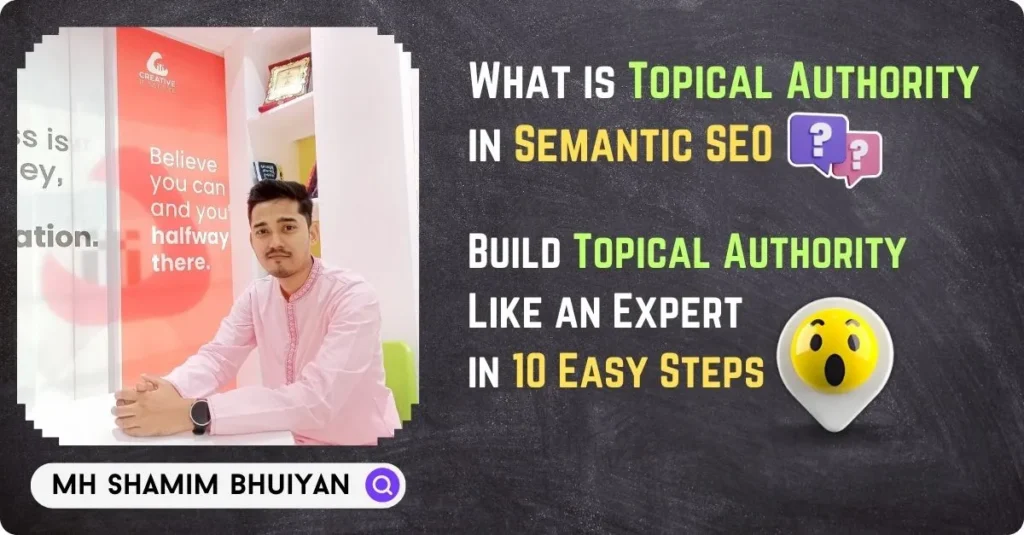
Want to rank higher on Google and get more traffic? Topical Authority is the key. Topical authority helps your website show expertise in a subject, which makes it rank higher. Google loves websites that cover topics in detail. In Semantic SEO, topical authority plays a big role. It helps Google understand your content better, which leads to higher rankings and more visitors.
To make your content even more relevant, use related keywords and long-tail keywords. Also, NLP helps search engines understand the meaning behind your content. Meanwhile, EEAT builds trust with both Google and your audience. In Bangladesh, where online competition is tough, having strong topical authority can help your business stand out. This guide explains it simply, so you’ll learn how to build Topical Authority and why it’s important for Semantic SEO.
Topical authority means being an expert on a subject. It shows that a website has useful and complete information. Google ranks websites higher when they have detailed and trustworthy content. Studies show that sites with strong topical authority get 30% more traffic. When a site covers a topic well, it becomes a trusted source.
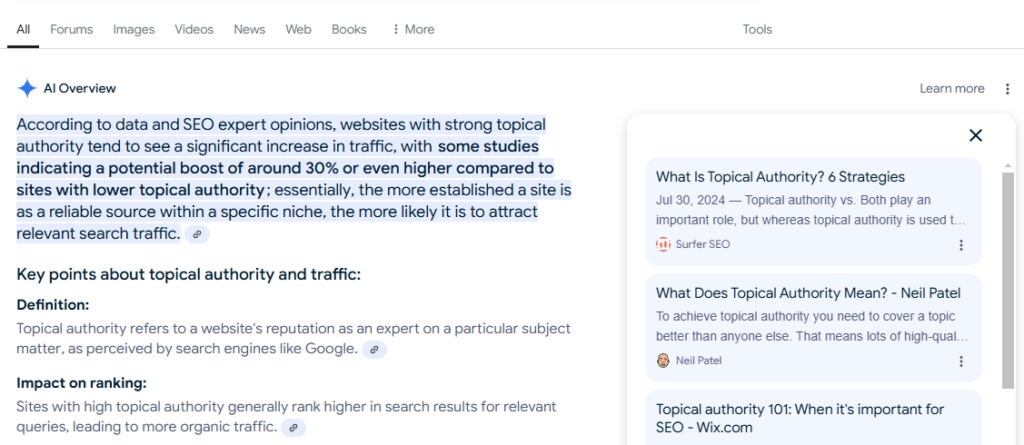
For example, a Semantic SEO site should have content on keyword clustering, structured data, and EEAT. Research shows that Semantic SEO can double search visibility. Covering related subtopics, or at least 10 – 15 topic clusters, helps Google understand the site better. Building topical authority takes time, but it leads to higher rankings, more traffic, and greater trust.
A Topical Authority Map is a simple way to show all the main topics and subtopics your website covers. It helps you organize your content to prove that you’re an expert on a subject. When you use a Topical Authority Map, Google can easily see that your website has detailed, useful content, which can help you rank higher in search results. A website that covers a topic in depth becomes a trusted source. Google loves websites that show strong authority in a specific topic, so having a well planned map of your topics is key.
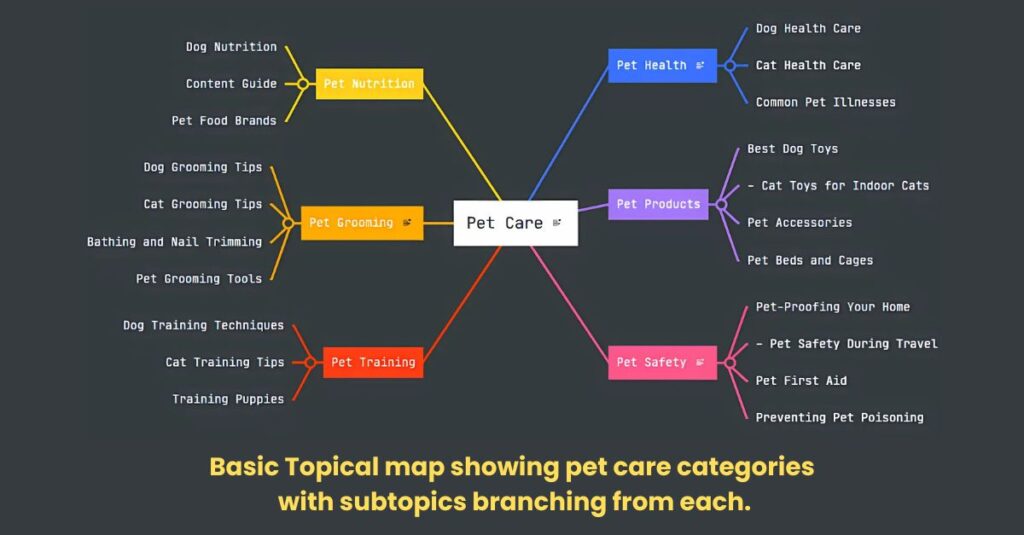
🎯 Need a Topical Map for your Website? Basic / Advanced / Premium package, I create customized topical maps to boost your SEO. Contact me on Facebook or LinkedIn to discuss your needs.
Pick Your Main Topics
Start by deciding what big topics you want your website to focus on. These are the main areas that are important for your business. For example, if you’re in SEO, your main topics might be Keyword Research, Content Optimization, and Link Building.
Break Down the Subtopics
For each main topic, think about smaller related topics. These are your subtopics. For example, under Keyword Research, subtopics could include LSI Keywords, Keyword Difficulty, and Search Intent. These smaller topics will help your content be more complete.
Create a Topical Map
Use tools like MindMeister or Lucidchart to draw a simple map showing how your main topics and subtopics connect. This will help you see how your content is organized and how everything relates to each other.
“I use MindMeister and ChatGPT to generate my topical authority map. It helps me visualize my content strategy and ensures I cover all related subtopics effectively.“ — Mh Shamim Bhuiyan
Check if You Covered Everything
Look at the content you already have. Make sure each main topic and subtopic is covered. If there are any gaps, write new content to fill them. Be sure to link the subtopics back to the main topic page.
Use AI Tools to Help
You can use tools like ChatGPT to help you create content for your topics and subtopics. AI can give you ideas, help you write detailed content, and suggest keywords to make your pages even better.
Creating a Topical Authority Map helps both people and Google easily find and understand your content. It makes your website look like an expert, which can lead to better rankings and more visitors.
Topical authority helps a website rank higher on Google. When a site covers a topic well, Google trusts it more. This leads to better visibility and more visitors.
Here’s why topical authority matters in Semantic SEO:
By building topical authority, websites can improve SEO, attract more visitors, and stay ahead of competitors.
Google checks several things to see if a website is an expert on a topic. It looks at how detailed and useful the content is. For example, a Semantic SEO site should cover things like keyword clustering, structured data, and EEAT. Internal linking is important too. Linking related pages helps Google understand how topics connect. It also makes it easier for visitors to find information. Google also checks if other trusted websites link to your content. If reliable sites link to you, it shows your site is credible.
Lastly, Google likes websites that update their content regularly. Fresh and updated content helps a website stay relevant and rank higher. By working on these things, a website can build strong topical authority and get more visitors.
Topical authority and Semantic SEO help improve rankings. Semantic SEO focuses on meaning, not just keywords. It helps search engines understand how topics are linked. First, it makes sure the content answers what users want. This builds a deeper understanding of the topic. Instead of just one keyword, Semantic SEO uses related words and LSI keywords. This strengthens the website’s authority. Google uses NLP (Natural Language Processing) to understand content better. Well-structured content with semantic HTML helps search engines. A good SEO strategy also makes content easier to read. This keeps users on the site longer. Using these strategies can help a website rank higher.
Building topical authority takes time and strategy. Follow these 10 steps to build authority in your niche and improve your website’s rankings.
Pick topics that matter to your audience and relate to your niche. Use keyword tools like Google Keyword Planner to find related keywords. Check what your competitors are writing about. Find common themes in their content. This helps you choose topics that boost topical authority and improve rankings.
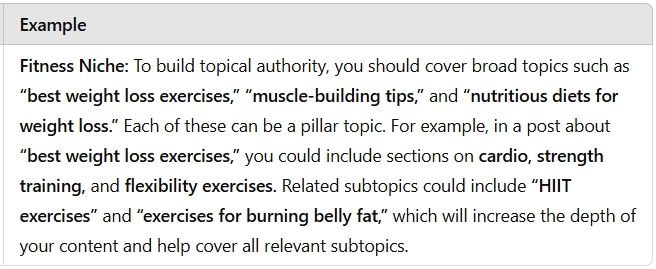
Write detailed content that answers common questions and provides useful information. Ensure your content offers more value than what’s already available. Semantic SEO works best when content is detailed and user-focused.
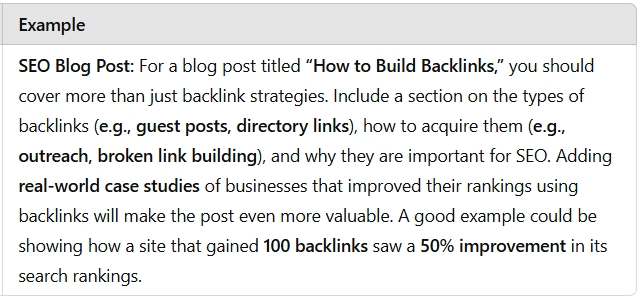
Structure your content into pillar pages (main topics) and cluster content (subtopics). Link the subtopics back to the pillar page. This organization enhances Semantic SEO and makes your site easier to navigate.
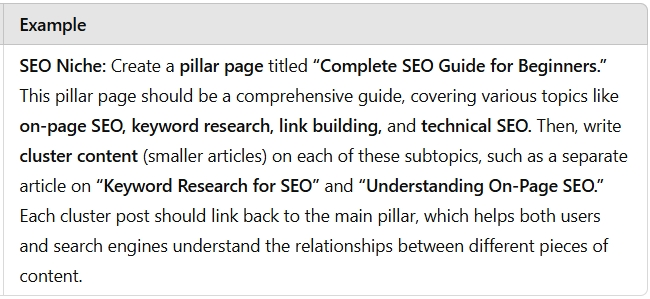
Answer common questions clearly and directly. Your content should match what people are searching for. Use Google’s “People Also Ask” section to find questions people ask in your niche. When your content directly addresses user needs, your topical authority strengthens.
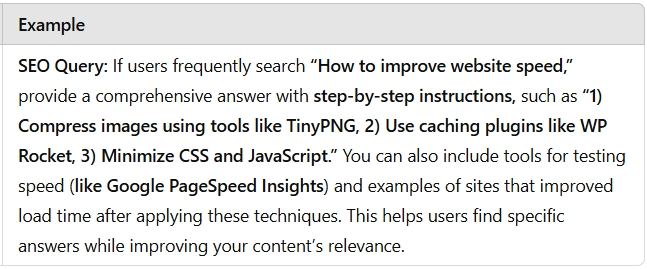
Break your content into sections with headings (H1, H2, H3). This helps both users and search engines understand your content better. Well structured content improves readability, keeping visitors engaged and boosting your Semantic SEO efforts.
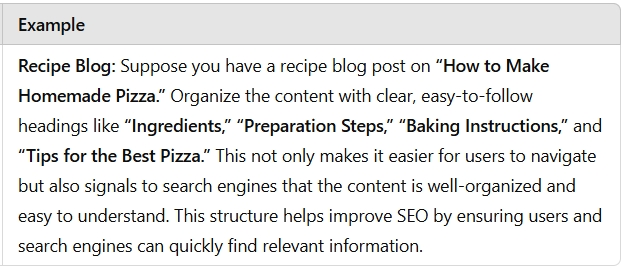
Link to other related pages on your site. This helps users find more information and helps search engines see how your content connects. Internal links also spread value across your site and help pages rank better.
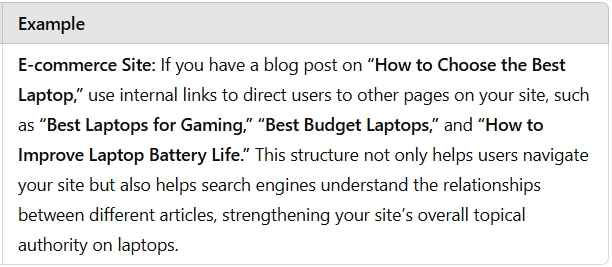
Write in a natural way. Don’t overuse keywords. Use related words that fit the topic. Writing naturally makes your content easier to read and more enjoyable for users. Avoiding keyword stuffing helps make your content feel more real and less robotic.
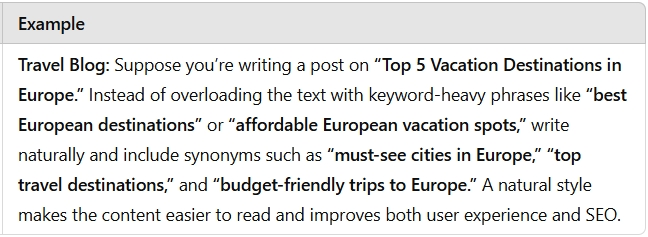
Focus on what users want when they search. Your content should give them exactly what they need. If someone searches for a question or topic, make sure your content answers it clearly. Aligning your content with user intent helps improve rankings and keeps visitors happy.
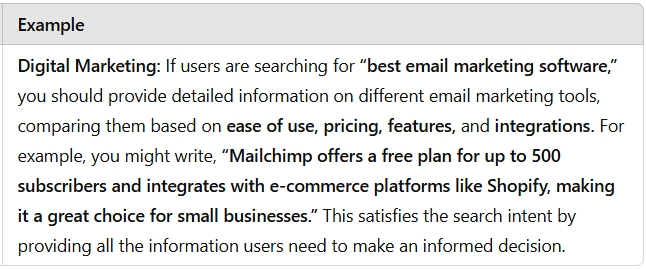
Show expertise, experience, authority, and trustworthiness (EEAT). Share real-world examples, earn backlinks from trusted sites, and ensure your website is secure. Strong EEAT improves Semantic SEO and credibility.
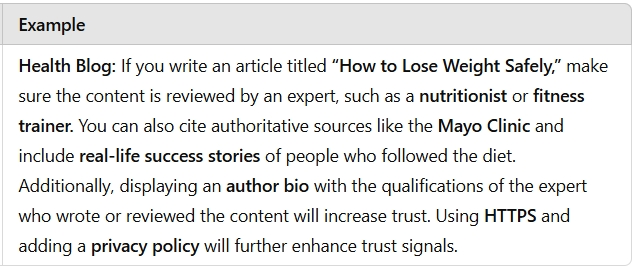
Use schema markup to help search engines understand your content better. This enhances Semantic SEO and can lead to rich snippets in search results. Structured data makes your content stand out in search results and helps Google understand it faster.
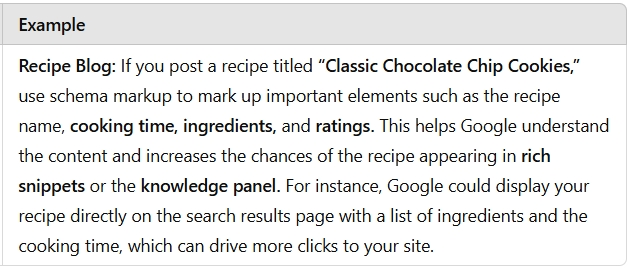
“Topical authority is about more than just covering a topic in detail. It’s about proving to both users and search engines that your website is the most reliable source of information in your niche. Building topical authority means becoming the go-to expert for your audience. The more value and context you provide, the higher your chances of ranking and earning trust.“ — Mh Shamim Bhuiyan.
By following these 10 steps, you can build topical authority and improve your Semantic SEO. This will help improve your rankings and bring more traffic to your website.
Building topical authority takes time and doesn’t happen quickly. It requires patience and consistent work. Research shows that websites with strong topical authority can get up to 30% more traffic. The more detailed and helpful your content is, the faster you can build authority. In fact, 70% of pages that rank well have content that covers a topic in-depth. Posting new content regularly and updating older posts also helps you build authority. Websites that do this can see up to a 50% boost in rankings.
Getting backlinks from trusted websites shows Google that your content is good, which helps speed up the process. Websites with good backlinks tend to rank 3.5 times higher in search results. But if you’re in a competitive niche, it might take longer to build authority. On average, it can take 8 months to a year to build strong topical authority, but with the right strategy, you can see traffic and ranking improvements sooner.
Building topical authority in Semantic SEO takes time. But some mistakes can slow you down and hurt your rankings. Avoiding these errors will help search engines and users trust your site. Here are the most common mistakes:
Quality matters more than quantity. Short or unhelpful content won’t make you an authority. Instead, create detailed and useful articles. For example, instead of a 300-word blog post, write a 1,500-word guide with key points, FAQs, and real-world examples.
It’s not just about keywords. You must know what users want. If your content doesn’t help them, they will leave fast. For example, if users search for “best budget smartphones,” they want recommendations, not just a definition. Give them comparisons, pros and cons, and reviews.
Internal links help users and search engines find related pages. Without them, your content may not rank well. A strong linking structure makes navigation easier. If you write about “SEO basics,” link to related posts like “On-Page SEO Tips” or “Best Keyword Research Tools.”
Copying content on different pages lowers rankings. Every page should have unique and useful information. Instead of repeating the same service description on different location pages, write custom content for each city or area.
Old facts make your content less trustworthy. Update your content regularly to keep it accurate and fresh. Search engines prefer up-to-date information. If you wrote about “Top Social Media Trends in 2022,” update it for 2025 with the latest insights.
Too many keywords make content hard to read and hurt rankings. Write naturally and use synonyms. Instead of repeating “best running shoes” too often, use variations like “top-rated running shoes” or “affordable running sneakers.”
Most people browse on mobile devices. If your site is slow or hard to read, visitors will leave. Google ranks mobile friendly sites higher. Use fast loading images, clear fonts, and a responsive design. Test your site on different devices.
If your business serves a local area, you need local SEO. Many businesses miss this step. A bakery in London should use keywords like “best bakery in London” and optimize its Google Business Profile with correct address, photos, and customer reviews.
By avoiding these mistakes, you can build topical authority. This will help boost your rankings, bring more traffic, and make your site a trusted source in your niche.
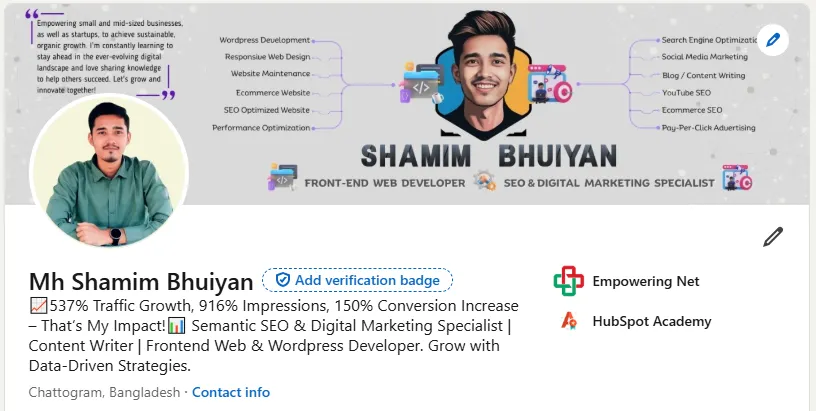
Mh Shamim Bhuiyan is a Semantic SEO expert with over 4 years of experience. He specializes in Semantic SEO, content writing, and digital marketing. He is certified by Creative IT Institute and HubSpot Academy. His SEO methods boost traffic and improve rankings. He also focuses on WordPress SEO, So websites load faster and rank higher. His Semantic SEO strategy increases search visibility. As a result, sites reach the 1st page faster. You can trust Mh Shamim Bhuiyan for expert SEO solutions that deliver real results.
Topical authority is key for long-term SEO success. By covering topics in detail, using related keywords, and focusing on user needs, you can build authority. Semantic SEO and EEAT are crucial for this. Internal linking, updating content, and avoiding common mistakes will also help. Stick to these strategies, and your website will become a trusted source in your niche. This means more traffic, higher rankings, and a stronger online presence.
“Follow these strategies, and your website will become a trusted source in your niche. This leads to more traffic, better rankings, and a stronger online presence.“ — Mh Shamim Bhuiyan.
To check if you have topical authority, look at:
It’s harder to build authority in many topics at once. Google likes websites that focus on one topic first. Once you’re an expert in one area, you can slowly add more related topics.
LSI keywords and long-tail keywords help make your content more relevant. These words are closely related to your main topic and help Google understand your content better. Using them helps you rank for more search queries.
It’s important to update your content regularly. Try updating your main pages every 6 to 12 months. You should also add new information when things change in your niche.